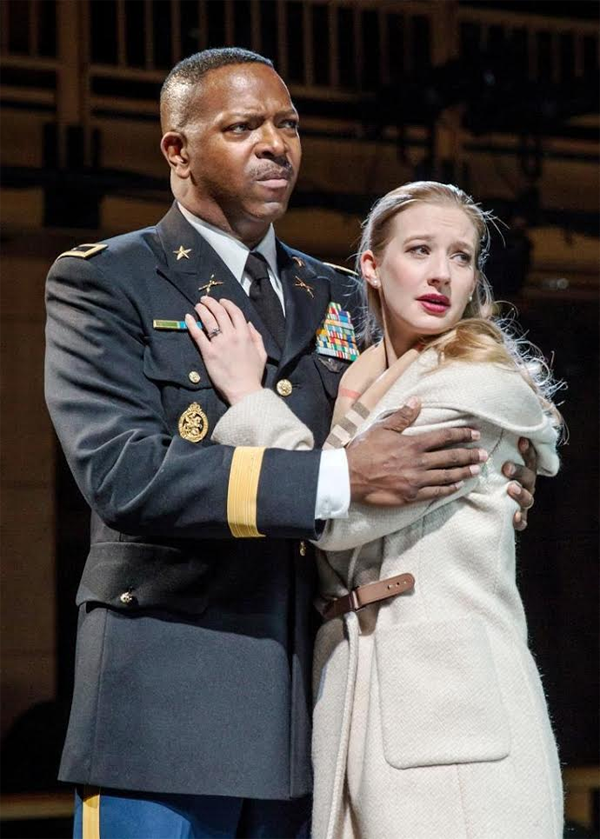What does a Shakespeare scholar do when, following her heart, she ends up as a stay-at-home mum in the American Midwest? Well, what she would always do – look for Shakespeare in her vicinity. Luckily, yours truly landed not on a desert island, but at the University of Notre Dame, one of the best colleges in America, which not only has a beautiful campus to push the stroller around, but also boasts an annual Shakespeare Festival. Furthermore, its Vice-Dean of the Arts is Peter Holland, one of the most renowned Shakespeare scholars of our time, who, with his name and person (and I guess a lot of hard work) locks the most exciting Shakespeare happenings to here. Because 2016 is a special year, marking the 400th anniversary of Shakespeare’s death, since January we have been flooded by things to do, see and attend.
First the university housed a copy of the First Folio, Shakespeare’s collected works from 1623, on lease here from the Folger Library of Washington DC. Then in rapid succession there came the conferences of Shakespeare in Prison (instructors who teach Shakespeare in performance to convicts, an amazing bunch of people) and of the Shakespeare Theatre Association. As April approached things started to heat up – with a world-premiere of the As You Like It opera, The Actors from the London Stage performing A Midsummer Night’s Dream, a Romeo and Juliet concert, a sonnet marathon and a Shakespearean birthday bash.

Promotional images for Shakespeare 400 Chicago.
Plus, since Chicago is just around the corner (well, it’s a two-hour drive, but American corners are bigger), I can also occasionally sneak there to get a taste of their Shakespeare 400 year. The windy city has packed in there everything a Shakespearean heart desires, so I still hope to see the hip-hop Othello scheduled for later this month, and of course take my family to “Shakespeare in the Park”. What I did manage to watch already was an Othello at the Chicago Shakespeare Theater, a production that, as they would say it here, blew my socks off. I don’t want to bore you with a full-on review, just try to give a few glimpses of the show, mainly the aspects that really appealed to me.
Othello is a play about race and several contemporary productions stress that aspect. In the America of today it would not have been unheard of to see an Othello that highlights racial tensions, but director Jonathan Munby chose to instead focus on what war does to people and to relationships, as well as to highlight how helpless women are in a war-driven masculine society. The production opened with Othello’s wedding to Desdemona, who exchanged vows and a kiss while rose petals showered the stage. These roses stayed on the stage for the characters to tread on and foreshadowed the strawberries on Desdemona’s kerchief as well as the drops of blood that end the play.

The Venetian Council.
The world of the young couple was one engaged in continuous warfare – Brabantio lived in a house with a brutalist concrete façade, where the intercom buzzed you in, but first you had to face the bodyguards. The Duchess of Venice sat in a situation room with her aids frantically tapping away on their laptops. Desdemona was a stranger to both worlds, no wonder she escaped to Othello’s – one of adventure and love. It also seemed a logical decision for her to go with him to Cyprus, since he was the only anchor in her life. That, of course, changed quickly.

Othello (James Vincent Meredith) and Desdemona (Bethany Jillard).
Desdemona is often type-cast in Shakespeare productions as a blonde ingénue, which basically robs the play of its drama. Bethany Jillard, on the other hand, portrayed her as an intelligent, sexy and confident young woman who made a leap of faith and ended up in a world unknown to her, just because she trusted her love. We’ve all been there, no? And as her world, built solely on Othello’s vow, crumbled around her, we got to experience what little means she had to reach out, to communicate, to get heard. Suddenly she became “the other”, a woman in designer clothes and civil(ian) manners in a menacing man’s world. The soldiers who had first welcomed her and teased her about her love would remain on stage to disturb her private moments before her last night with Othello – their menacing presence darkly foreshadowing that of her husband’s. The production wonderfully visualized how Desdemona’s living space shrunk – first the thrust stage fenced in at the back, then a container used as a house, and finally, the marital bed.

Small spaces on a great stage.
As an added bonus, this Othello gave us the wonderful story of female friendship between Desdemona and Emilia (Jessie Fisher). Emilia, a soldier herself in this production, at first carried her ladyship’s luggage around with a disdainful scorn, but, when realizing how helpless Desdemona has been she grew affectionate for her. The willow scene was not only a wonderful moment displaying female friendship, but also a terrifying realization of how powerless these women were. Indeed, Desdemona was not the only one weeping in the theatre during the scene.
I could go on and talk about Michael Milligan’s Iago or James Vincent Meredith’s Othello, but why I chose to write about this production is this: if your job, like mine, is watching Shakespeare in performance, you do get cynical and after a while it is very hard to surprise you. But halfway through this Othello I realized that sitting on the edge of my seat, like the notary of Peleske, I was ready to run onstage and stop this wonderful man from murdering this amazing woman. That there was a point in the production when I forgot that I was watching a play I knew. That at the very end I missed my one chance (for which I am utterly-terribly sorry) to join the (for me otherwise really annoying) American tradition of the standing ovation, because I was so moved I could not pull myself together. That afterwards, walking in the sunshine with my husband and my son, enjoying our day out in Chicago I just could not escape the play I had just seen.
So, what is the moral of the story? If no time else, this anniversary year get some Shakespeare into your lives. It will do you good. I’m speaking from experience.
Press images taken from Shakespeare 400 Chicago’s website, stage photos by Liz Lauren.


